Introduction
Taking a long road trip in an RV has become increasingly popular over the years because of its convenience and affordability. An RV allows you to bring all the comforts of home with you on your journey, from your bed and kitchen to entertainment options such as TVs, DVD players, and more.
With an RV, you can enjoy the freedom of traveling at your own pace while still having access to all the amenities that make life on the open road enjoyable. When choosing a vehicle for a long-term trip, there are several factors to consider, including size and style, fuel efficiency, amenities offered, price range, and storage space available. From Class A motor homes to fifth wheels or travel trailers, each type of RV offers something different in terms of comfort level and features. So, researching the best type of RV for your lifestyle is key!
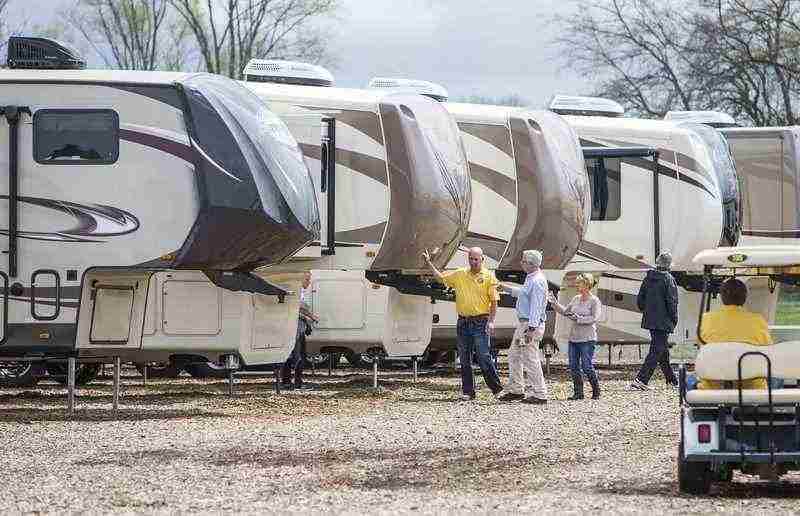
The RV Types Available
What are the three types of RVs? The first major categorization of recreational vehicles is motorized RVs, towables, and truck campers. Motor homes are further categorized into RV Classes A, B, and C. Towable (trailers) come in bumper-pull versions (called travel trailers) and fifth-wheel versions.
Motorized RVs

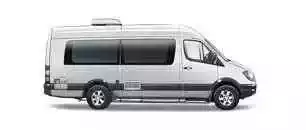
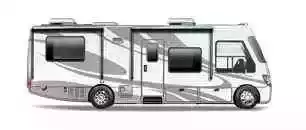
Class A Motorhomes are the largest type of RV and offer the most comfort and luxury. These big rigs come with a variety of amenities such as slide-outs, full kitchens, luxurious bathrooms, and multiple sleeping areas. Class A motor homes provide plenty of space for traveling families or larger groups to spread out on long trips.
Class A Motor homes are the largest type of RV
For those looking for something a bit more compact than Class A motor homes but still want all the luxuries they offer, there are Class B Motor homes. These units are smaller in size, but don’t sacrifice any features! With many models offering slide-outs just like their bigger counterparts, these motorized vehicles can be great for couples or small families who love to explore without having to worry about driving a large RV around tight turns or narrow roads.
Of the three RV sizes, Class C is generally considered mid-size. This type of RV can be identified by the fact that it is built on a van or truck chassis and still has that original van or truck “nose” on it. The coach section is built on the back of the chassis, in many cases with a bunk section over the cab.
Truck Campers

For anyone wanting a type of RV that’s both versatile and affordable, then Truck Campers may be right up your alley. While not as spacious as other options, they do make it easier to maneuver in tighter spaces and fit into standard garages when you reach your destination! They usually require some type of pickup truck, so if you already have one, this is definitely something worth considering before making your final purchase decision.
For anyone wanting an type of RV that’s Versatile and affordable,consider a Truck Camper
Travel Trailers
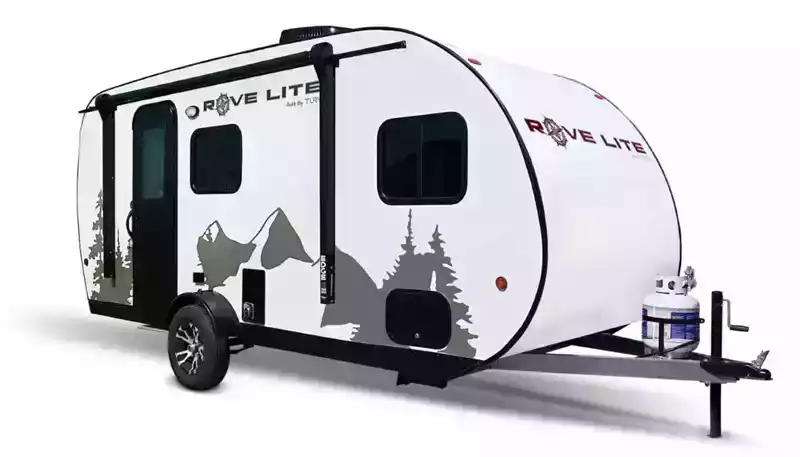
Travel Trailers come in many different sizes, from ultra-lightweights at under 3,000 lbs to heavy-duty models that weigh over 10k pounds, depending on what type of vehicle you will need to tow them safely. Generally speaking, travel trailers can accommodate several people comfortably and offer some great amenities, such as slide-outs, which add extra living space once set up at campsites along your journey!
Fifth Wheels

Lastly, Fifth Wheels typically range from 20 to 45 feet long and feature two levels, allowing more privacy between occupants during extended stays on the road—perfect for couples or family getaways alike!
Toy Haulers
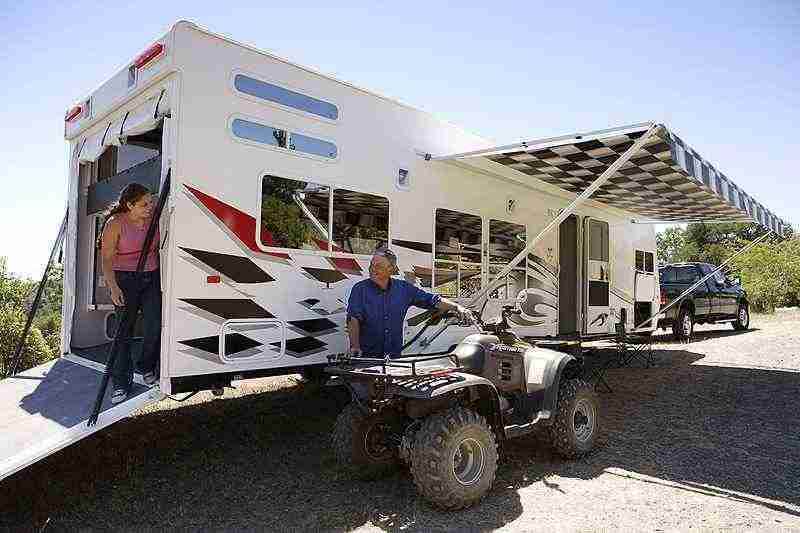
Toy Haulers are designed with a rear garage so that you can take along your big boy toys like a motorcycle or ATV, for example. They also provide a lot of additional storage space for other big items. Toy Haulers are offered in Travel Trailer, Fifth Wheel, and Motor home formats.
Purchase Factors
Fuel Efficiency
Calculating fuel efficiency can be a great way to see how much you are spending on fuel during your road trips and make adjustments accordingly. A different type of RV may give you greater fuel economy with comparable living quarters and amenities. There are two main ways to calculate the fuel efficiency of your RV: Miles Per Gallon (MPG) or Liters per 100 kilometers (L/100km).
Calculating fuel efficiency can be a great way to see how much you are spending on fuel
Both measurements will give you an idea of how much fuel is being used for each mile traveled, but the MPG measure is more commonly used in North America while L/100km is generally seen in Europe. To calculate MPG, simply divide the total number of miles driven by the number of gallons used, while L/100km requires multiplying liters consumed by one hundred and then dividing that result by kilometers traveled.
Once you have calculated your current fuel efficiency level, you can take several steps to improve it. First and foremost, always keep up with regular maintenance such as oil changes, tire pressure checks, air filter replacements, etc., as these can all help reduce drag on engine parts, which will lead to improved performance and lower consumption rates.
Additionally, driving at moderate speeds increases aerodynamics, making it easier for engines to move forward, thus using less gas. Keeping speed at or under posted limits also helps save money! Lastly, packing light, when possible, reduces weight, meaning there’s less strain on the engine, resulting in better overall mileage over time!
Amenities and Storage Space
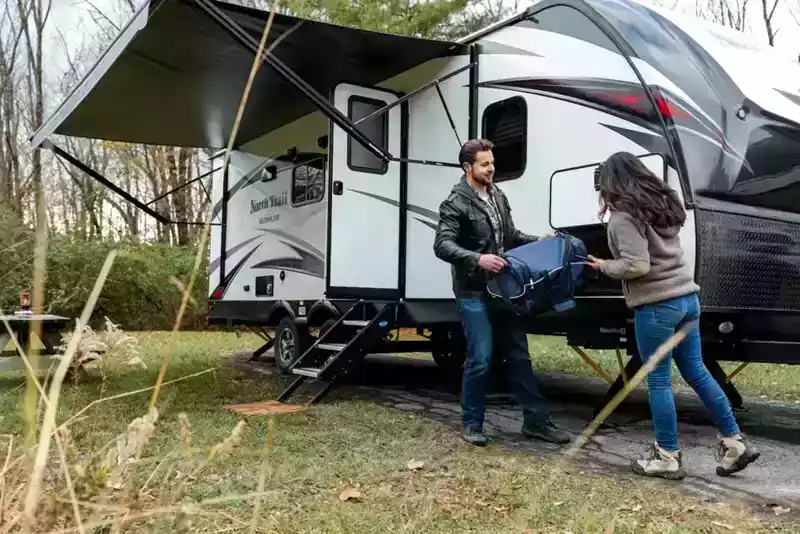
When it comes to amenities, one of the most important things to consider when selecting a type of RV is the type and quality of features offered. Different models will come with different levels of comfort and luxury, so if you are looking for a high-end experience, then make sure to look at Class A motor homes or fifth wheels, which offer plenty in terms of amenities.
Look for features like slide-outs, full kitchens, luxurious bathrooms, multiple sleeping areas, and entertainment options such as TVs, DVD players, etc. On the other hand, if you have a more modest budget, travel trailers can still provide ample comfort without breaking the bank!
one of the most important things to consider when selecting aN RV is the type and quality of features offered
Another key factor when shopping for an RV is the storage space available. It’s important to make sure that your vehicle has enough room for all your camping supplies and personal items—especially on long trips!
Many units feature exterior compartments perfect for storing bulky items like coolers or firewood while interior cabinets are great for keeping smaller goods organized throughout your journey. Additionally, some models even have overhead bunk spaces, which provide another place to stash away extra gear while not in use – making them ideal solutions when traveling with larger groups who need extra space!
Price Considerations
Before you consider whether that RV for sale is the right one for you, you will certainly have to consider the cost of it. The cost of an RV can vary widely depending on factors such as size, features, and amenities. A larger type of RVs will typically come with a higher price tag due to the added comfort and luxury that they offer.
Additionally, certain types of RVs may be more expensive in certain areas due to availability or demand – so make sure to shop around for the best deal! Another factor that affects prices is whether you are buying new or used – while used vehicles tend to have lower upfront costs, they also come with more risks when it comes to maintenance, so do your research before making any final decisions.
For those looking into recreational vehicle financing, there are several different options available, ranging from traditional loans through banks or credit unions to specialized RV loan companies that specialize solely in this type of purchase. Many lenders will require at least a 10-20% down payment along with proof of income, but most major banks now have specific divisions dedicated specifically to RV-related loans, which makes them easier than ever before!
Additionally, dealerships often offer their own financing packages, which could include extended warranties and other helpful benefits – just make sure to read over everything carefully beforehand and compare rates if possible before signing on any dotted lines!
Finalizing Your Choice of Type of RV
Before making your final decision on a type of RV, it is important to take the time to test drive whatever model you are interested in. While this may not be possible when shopping online, most dealerships will have test driving available so that you can get a feel for the size and handling of the RV before committing to purchase.
When taking an RV out for a spin, make sure to note any issues such as shuddering or strange noises—these could be signs of mechanical problems that should be addressed prior to buying! Additionally, testing how well it brakes, accelerates, and turns corners can give you additional insight into its overall performance level.
In addition to taking an RV for a spin, always make sure that there are maintenance records available from previous owners if applicable. This will help provide assurance that basic upkeep has been completed regularly in order to keep everything running smoothly throughout your travels.
Check both interior and exterior components such as tires, brakes, and engine parts, along with fluid levels like coolant or oil. All of these should match the manufacturer’s recommended specifications listed in the manual provided by sellers or dealerships. If there is no official documentation, then ask questions about what types of services have been done recently. If something seems off, don’t hesitate to ask for more details until satisfied! Still need more information? Have a look at this guide from Trip Savvy.
FAQs
How many types of RVs are there?
There are three classifications of motor homes: A, B, and C. Towable RVs are divided into travel trailers and fifth wheels. The sixth category is truck campers.
What are the differences in RV types?
Aside from the main divisions of motorized RVs and towable RVs, the main difference is the size and amenities available. Larger Class A motor homes will have much more space and more features than a Class B van, as a fifth wheel trailer will have over a travel trailer.
What is a Class B or C RV?
Class B Vans use essentially the van body as the motor home’s coach, while Class C motor homes only use the cab and chassis portion of the base vehicle with a purpose-built coach section not built by the chassis manufacturer.
What are Class A and C RVs?
Class A RVs are square, like a bus, and class C can be identified by the original truck manufacturer’s cab showing at the front of the RV.
How Hard is it to Drive a motorized RV or tow a trailer?
It’s not hard, but it may require some training so you feel comfortable. Some dealers or RV clubs will offer RV classes for beginners in your area. Be aware that license requirements may be different for different RV classes.
Conclusion
In conclusion, getting the right recreational vehicle for your road trip can make all the difference in how much you enjoy your journey. Make sure to do plenty of research before making a purchase so that you know exactly what type of RV best fits your needs and budget.
Calculate fuel efficiency, as well as consider amenities, storage space, and cost when selecting a type of RV—all of these factors play into how enjoyable (and affordable!). your experience will be! Finally, take it for a test drive so that you can get a feel for its performance level and check maintenance records, if applicable, to ensure it is running smoothly prior to committing. With these tips in mind, we wish you many safe travels on the open road!










